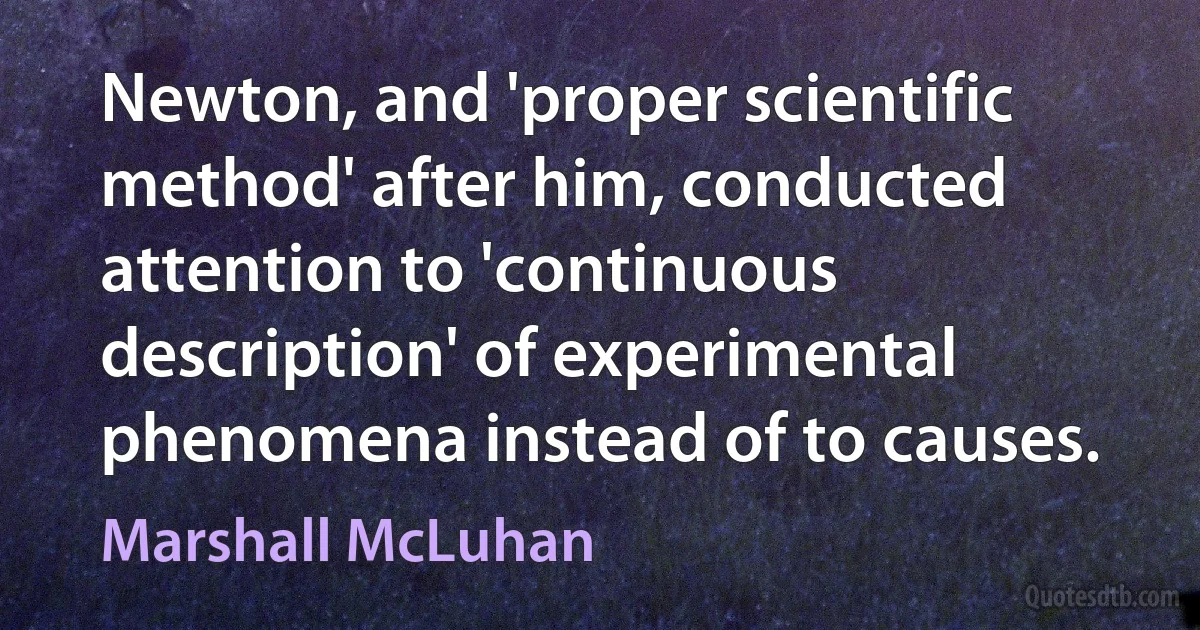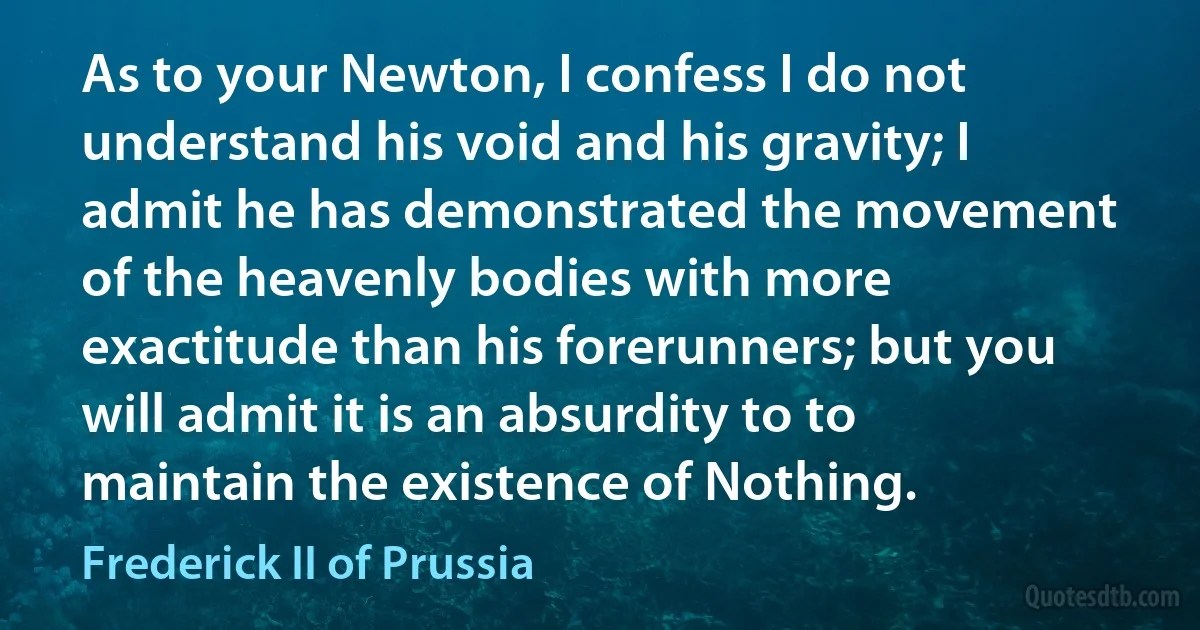Newton Quotes - page 3
I... chose rather to publish... in puris Naturalibus, or as they were produced as first, than be at the Trouble of reducing them into any other Form... I could not bear the Pains of reading over again a great Part of these Things; either from my being tired with them, or not caring to undergo the Pains and Study in new modelling them. But I have done in this as weakly Mothers, who give up their Offspring to the Care of their Friends, either to Nurse and bring up, or abandon to the wide World. One of which is Mr. Isaac Newton, my Collegue, a Man of great Learning and Sagacity, who revised my Copy and noted such Things as wanted Correction, and even gave me some of his own, which you will see here and there interspersed with mine, not without their due Commendations. The other is Mr. John Collins (who may be deservedly called the Mersennas of our Nation, Born to promote this Science, both with his own Labours, and those of others. Who with much Trouble took care of the Edition.

Isaac Barrow
All the men who are now called discoverers, in every matter ruled by thought, have been men versed in the minds of their predecessors, and learned in what had been before them. There is not one exception. I do not say that every man has made direct acquantance with the whole of his mental ancestry... But... it is remarkable how many of the greatest names in all departments of knowledge have been real antiquaries in their several subjects.
I may cite among those... in science, Aristotle, Plato, Ptolemy, Euclid, Archimedes, Roger Bacon, Copernicus, Francis Bacon, Ramus, Tycho Brahe, Galileo, Napier, Descartes, Leibnitz, Newton, Locke.

Augustus De Morgan
Even a statement very close to the periphery can be held true in the face of recalcitrant experience by pleading hallucination or by amending certain statements of the kind called logical laws. Conversely, by the same token, no statement is immune to revision. Revision even of the logical law of the excluded middle has been proposed as a means of simplifying quantum mechanics; and what difference is there in principle between such a shift and the shift whereby Kepler superseded Ptolemy, or Einstein Newton, or Darwin Aristotle?

Willard van Orman Quine
The whole history of the world shows that the Indian intellect is second to none. This must be proved by the performance of a task beyond the power of others, the seizing of the first place in the intellectual advance of the world. Is there any inherent weakness that would make it impossible for us to do this? Are the countrymen of Bhaskaracharya and Shankaracharya inferior to the countrymen of Newton and Darwin? We trust not. It is for us, by the power of our thought, to break down the iron walls of opposition that confront us, and to seize and enjoy the intellectual sovereignty of the world.

Sister Nivedita
Newton and Descartes started to try and prove that God existed in the same way as they would try and prove something in the laboratory or with their mathematics ... And when you try and mix science and religion you get bad science and bad religion. The two are doing two different things. ... Science can give you a diagnosis of cancer. It can even cure your disease, but it cannot touch your grief and disappointment, nor can it help you to die well.

Karen Armstrong
There are already scientists-- respected scientists in this country who do experiments on things that most people consider supernatural, such as prayer. When Newton proposed the theory of gravitation it was dismissed as supernaturalism because it was action at a distance. What constitutes supernaturalism in today's science may very well not be supernatural in tomorrow's science.

Jonathan Wells
Darwin's theory of evolution was simple, beautiful, majestic and awe-inspiring. But because it contradicts the allegorical babblings of a bunch of made-up old books, it's been under attack since day one. That's just tough luck for Darwin. If the Bible had contained a passage that claimed gravity is caused by God pulling objects toward the ground with magic invisible threads, we'd still be debating Newton with idiots too.

Charlie Brooker
A textual critic engaged upon his business is not at all like Newton investigating the motions of the planets: he is much more like a dog hunting for fleas. If a dog hunted for fleas on mathematical principles, basing his researches on statistics of area and population, he would never catch a flea except by accident.

A. E. Housman
Now, if instituting comparisons in both directions, we place the lowest and most ape-like men (the Austral Negroes, Bushmen, and Andamans, etc.), on the one hand, together with the most highly developed animals, for instance, with apes, dogs, and elephants, and on the other hand, with the most highly developed men-Aristotle, Newton, Spinoza, Kant, Lamarck, or Goethe-we can then no longer consider the assertion, that the mental life of the higher mammals has gradually developed up to that of man, as in any way exaggerated. If one must draw a sharp boundary between them, it has to be drawn between the most highly developed and civilized man on the one hand, and the rudest savages on the other, and the latter have to be classed with the animals.

Baruch Spinoza
Newton was born during Cromell's revolution in the troubled 1640s; he was eighteen at the Restoration in 1660; and he published the Principia during the intrigues which ended by bringing William of Orange to England in the revolution of 1688. These are the moments when the powerful or the forceful character feels the ferment of the times, when his thoughts quicken...

Jacob Bronowski
...In that same period there was Newton, there was Harvey studying the circulation of the blood, there were people with methods of analysis by which progress was being made! You can take every one of Spinoza's propositions and take the contrary propositions and look at the world--and you can't tell which is right. Sure, people were awed because he had the courage to take on these great questions, but it doesn't do any good to have the courage if you can't get anywhere with the question...

Richard Feynman
Philosophers are generally persuaded, that the sensations of heat and cold are occasioned by the presence or absence, in degree, of certain principle or quality denominated fire or heat... It is most probable, that all substances whatever contain more or less of this principle. Respecting the nature of the principle, however, there is a diversity of sentiment : some supposing it a substance, others a quality, or property of substance. Boerhaave, followed by most of the moderns, is of the former opinion; Newton, with some others, are of the latter; these conceive heat to consist in an internal vibratory motion of the particles of bodies.

John Dalton
We are going to die, and that makes us the lucky ones. Most people are never going to die because they are never going to be born. The potential people who could have been here in my place but who will in fact never see the light of day outnumber the sand grains of Arabia. Certainly those unborn ghosts include greater poets than Keats, scientists greater than Newton. We know this because the set of possible people allowed by our DNA so massively outnumbers the set of actual people. In the teeth of these stupefying odds it is you and I, in our ordinariness, that are here.

Richard Dawkins
Even when, after centuries of license, the Church reformed its discipline, and, to prove it, burned Giordano Bruno in 1600, besides condemning Galileo in 1630 - as science goes on repeating to us every day - it condemned anarchists, not atheists. None of the astronomers were irreligious men; all of them made a point of magnifying God through his works; a form of science which did their religion no credit. Neither Galileo nor Kepler, neither Spinoza nor Descartes, neither Leibnitz nor Newton, any more than Constantine the Great - if so much - doubted Unity. The utmost range of their heresies reached only its personality.

Henry Adams
The Church alone had constantly protested that anarchy was not order, that Satan was not God, that pantheism was worse than atheism, and that Unity could not be proved as a contradiction. Karl Pearson seemed to agree with the Church, but everyone else, including Newton, Darwin and Clerk-Maxwell, had sailed gaily into the supersensual.

Henry Adams
Billy coughed when the door was opened, and when he coughed he shit thin gruel. This was in accordance with the Third Law of Motion according to Sir Isaac Newton. This law tells us that for each reaction there is a reaction which is equal and opposite in direction. This can be useful in rocketry.

Kurt Vonnegut



